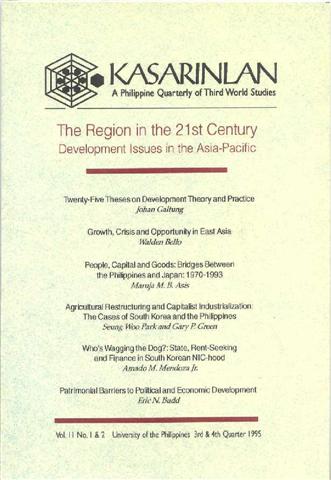Who's Wagging the Dog: State, Rent-seeking, and Finance in South Korean NIC-hood
Abstract
In assessing the changing patterns of state-big business relations vis-à-vis South Korean NIC-hood, two paradoxical perspectives come to the fore. The state-centric perspective, on the one hand alludes to the state’s strategy to tightly control finance as source of state-assigned rents that would subsidize the business conglomerates or chaebols. Accordingly, the junior partner dependency alliance that arises from this relationship results in rent-seekers becoming receptive to state initiatives, thus being disciplined in the process as they comply with standards imposed upon them. On the other hand, the alternative business-centric perspective deems the state as autonomous to capital such that other sources of credit like global finance markets, become accessible to chaebols. As such, the dependence of chaebols on state assigned largesse is reduced inasmuch as the state’s clout is weakened. The earlier view is criticized in that the nurturing state inevitably becomes hostage to business conglomerates as it bails out the latter in times of economic downturns. In effect, big business gains for economic and political strength, enough to influence vulnerable politicians to ensure policy continuity to its favor, as well as to support rent-seeking efforts. In the attempt to explore possibilities for a more balanced view of state-big business relations, the discussion further expounds on South Korean regimes from Park to Roh, with respect to the utilization of finance as a potent industrial policy toll and on the competing approaches to industrialization between a seeming laissez fair perspective and others.
How to Cite
MENDOZA JR., Amado.
Who's Wagging the Dog: State, Rent-seeking, and Finance in South Korean NIC-hood.
Kasarinlan: Philippine Journal of Third World Studies, [S.l.], v. 11, n. 1, june 2007.
ISSN 2012-080X.
Available at: <https://journals.upd.edu.ph/index.php/kasarinlan/article/view/1628>. Date accessed: 24 aug. 2025.
Section
Features
Keywords
Rent-seeking, South Korea, NIC-hood
By submitting a manuscript, the authors agree that the exclusive rights to reproduce and distribute the article have been given to the Third World Studies Center.



